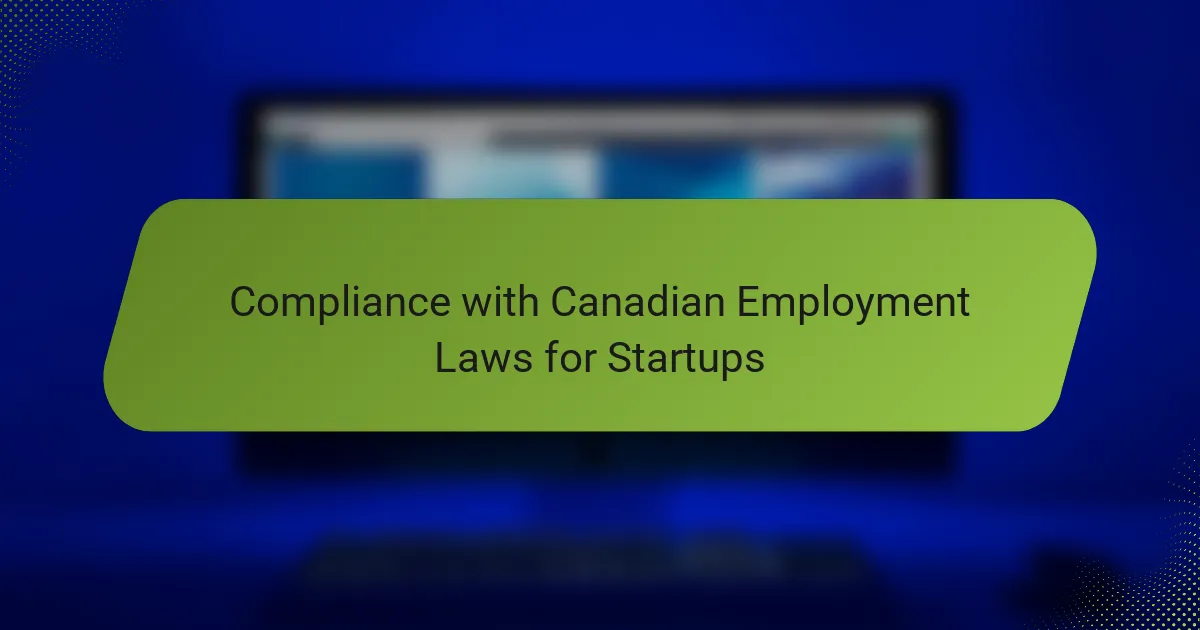Startups in Canada face a range of compliance requirements that are essential for lawful employment practices. Adhering to regulations on employment standards, health and safety, and human rights is crucial to avoid significant repercussions such as financial penalties and legal disputes. By implementing structured training and consulting legal experts, startups can navigate these complexities and foster a compliant workplace culture.

What Are the Key Compliance Requirements for Startups in Canada?
Startups in Canada must adhere to several key compliance requirements that govern employment practices. These include regulations related to employment standards, health and safety, human rights, payroll deductions, and workplace insurance.
Employment Standards Act
The Employment Standards Act (ESA) sets the minimum standards for working conditions in Canada. Startups must ensure compliance with regulations regarding working hours, overtime pay, vacation entitlements, and termination rights.
For example, employees are generally entitled to at least two weeks of paid vacation after one year of employment. Startups should familiarise themselves with the specific provisions applicable in their province, as these can vary significantly.
Occupational Health and Safety Regulations
Occupational Health and Safety (OHS) regulations require employers to provide a safe working environment. Startups must conduct regular risk assessments and implement safety protocols to protect employees from workplace hazards.
Additionally, training employees on safety procedures and ensuring access to necessary safety equipment is crucial. Non-compliance can lead to fines and increased liability for the business.
Human Rights Code
The Human Rights Code prohibits discrimination in the workplace based on various grounds, including race, gender, and disability. Startups must create an inclusive environment and establish policies that promote equality and respect among employees.
It is essential to provide training on diversity and inclusion and to have clear procedures for addressing complaints of discrimination or harassment. This not only fosters a positive workplace culture but also mitigates legal risks.
Payroll Deductions
Startups are responsible for making mandatory payroll deductions from employee wages, including Canada Pension Plan (CPP) contributions, Employment Insurance (EI) premiums, and income tax withholdings. Understanding these obligations is vital to avoid penalties.
Employers should regularly review their payroll processes to ensure accurate calculations and timely remittances to the Canada Revenue Agency (CRA). Failure to comply can result in significant fines and interest charges.
Workplace Safety Insurance
Workplace Safety Insurance is a requirement for most employers in Canada, providing coverage for workplace injuries and illnesses. Startups must register with their provincial workers’ compensation board and pay premiums based on their payroll and industry risk level.
Having this insurance not only protects employees but also shields the startup from potential lawsuits related to workplace injuries. It is advisable to regularly review coverage options to ensure adequate protection as the business grows.

How Can Startups Ensure Compliance with Employment Laws?
Startups can ensure compliance with Canadian employment laws by implementing structured training, consulting legal experts, and utilising HR software. These strategies help navigate the complexities of labour regulations and foster a compliant workplace culture.
Regular Training Programs
Regular training programs are essential for keeping employees informed about their rights and responsibilities under Canadian employment laws. These programs should cover topics such as workplace safety, anti-discrimination policies, and employee benefits.
Consider scheduling training sessions at least once a year, with additional sessions whenever there are significant legal updates. Engaging employees through interactive workshops can enhance understanding and retention of important compliance information.
Consulting Legal Experts
Consulting legal experts is a crucial step for startups to navigate employment law complexities. Legal professionals can provide tailored advice on various topics, including labour standards, employee contracts, and dispute resolution processes.
Establish a relationship with an employment lawyer who specialises in Canadian labour laws. This can help ensure that your startup remains compliant and can quickly address any legal issues that arise, potentially saving time and resources in the long run.
Implementing HR Software
Implementing HR software can streamline compliance processes by automating record-keeping and reporting. Many HR platforms offer features that help track employee hours, manage payroll, and ensure adherence to labour regulations.
Choose HR software that is specifically designed for the Canadian market, as it will be more likely to include relevant compliance features. Regularly update the software to reflect any changes in employment laws, ensuring your startup remains compliant and efficient.

What Are the Consequences of Non-Compliance?
Non-compliance with Canadian employment laws can lead to significant repercussions for startups, including financial penalties, legal disputes, and damage to their reputation. Understanding these consequences is crucial for maintaining a compliant and sustainable business.
Fines and Penalties
Startups that fail to comply with employment regulations in Canada may face fines and penalties imposed by government agencies. These fines can vary widely, often ranging from hundreds to thousands of Canadian dollars, depending on the severity of the violation.
For example, failing to meet minimum wage standards or not adhering to workplace safety regulations can result in hefty fines. It’s essential for startups to stay informed about the applicable laws to avoid these financial burdens.
Legal Action from Employees
Employees have the right to take legal action against employers who violate their rights under Canadian employment laws. This can include claims for unpaid wages, wrongful termination, or discrimination, which may lead to costly legal battles.
Litigation not only incurs legal fees but can also result in settlements or judgments that further strain a startup’s finances. Proactively addressing employee concerns and ensuring compliance can help mitigate the risk of such legal actions.
Reputation Damage
Non-compliance can severely damage a startup’s reputation, making it difficult to attract and retain talent. Negative publicity can spread quickly, especially in today’s digital age, where employee experiences are shared widely on social media and review platforms.
A tarnished reputation may deter potential employees and customers alike, impacting overall business success. Startups should prioritise compliance to foster a positive workplace culture and maintain a strong public image.

What Resources Are Available for Startups?
Startups in Canada can access various resources to ensure compliance with employment laws. These resources include government websites, provincial offices, and HR consulting firms that provide guidance on legal requirements and best practices.
Government of Canada Resources
The Government of Canada offers a wealth of resources for startups to navigate employment laws. Websites such as the Canada.ca portal provide information on federal labour standards, employee rights, and employer obligations. Startups can also find guidelines on hiring practices, workplace safety, and payroll requirements.
Utilising these resources can help startups understand their legal responsibilities and avoid costly compliance issues. Regularly checking for updates on employment regulations is advisable, as laws can change frequently.
Provincial Employment Standards Offices
Each province in Canada has its own Employment Standards Office that outlines specific labour laws and regulations. These offices provide essential information on minimum wage, working hours, overtime pay, and employee benefits tailored to local contexts.
Startups should familiarise themselves with their provincial standards, as they can vary significantly. Engaging with these offices can also provide access to workshops and resources tailored for new businesses, helping them stay compliant.
HR Consulting Firms
HR consulting firms specialise in helping startups manage their human resources effectively while ensuring compliance with employment laws. These firms offer services such as policy development, employee training, and compliance audits.
Hiring an HR consultant can be particularly beneficial for startups lacking in-house HR expertise. They can provide tailored advice and practical solutions to common HR challenges, helping startups focus on growth while maintaining legal compliance.

How to Choose an HR Consultant for Compliance?
Choosing an HR consultant for compliance with Canadian employment laws involves evaluating their expertise, reputation, and understanding of local regulations. A well-selected consultant can help navigate the complexities of employment standards, payroll, and workplace safety requirements.
Experience with Canadian Employment Laws
When selecting an HR consultant, prioritise those with substantial experience in Canadian employment laws. Look for consultants who have worked with startups and understand the unique challenges they face, such as navigating provincial regulations and federal standards.
Consider asking potential consultants about their familiarity with specific laws, such as the Canada Labour Code and provincial employment standards. A consultant with a strong background in these areas can provide tailored advice that aligns with your business needs.
Client Testimonials
Client testimonials are a valuable resource when assessing an HR consultant’s effectiveness. Look for feedback from other startups that have successfully navigated compliance issues with the consultant’s help. Positive reviews can indicate a consultant’s reliability and expertise.
Request references or case studies that demonstrate the consultant’s impact on previous clients. This can provide insight into their problem-solving abilities and how they handle compliance challenges in real-world scenarios.
